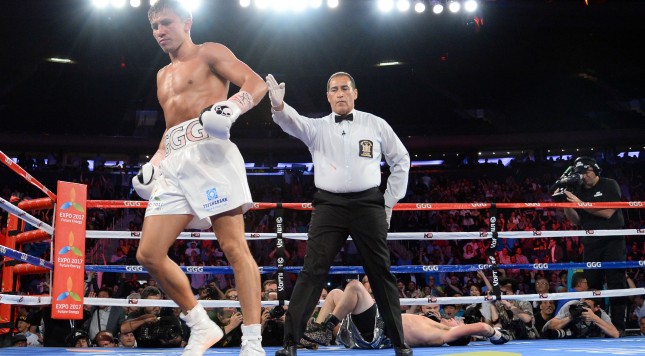(July 26; New York; Gennady Golovkin [white gloves] reacts after knocking out Daniel Geale [black gloves] during their middleweight bout at Madison Square Garden. Credit: Joe Camporeale-USA TODAY Sports)
In the win-loss measurement of things, Australian boxing has had a terrible few weeks. First Daniel Geale got smashed quickly by Gennady Golovkin. Then Blake Caparello got smashed even quicker by Sergey Kovalev. Next came Jarrod Fletcher getting halted by Danny Jacobs. Adopted Australian Sakio Bika last weekend lost his rematch against Anthony Dirrell, and last night Daniel Dawson got beaten up by Austin Trout after an early strong showing. “Australia,” ESPN2’s Todd Grisham said at one point toward the end of the fight (in a way that didn’t sound great for the continent even though he meant that Australia might be happy if Dawson could muster another right hand), “might explode off the planet.”
Australia, though, should not hang its head low. Australian boxers dared. They came in as underdogs, and they fell short. They did nothing more or less than was expected of them. But, unlike others, they tried. Had they ventured nothing, they would have had the exact same success rate, but with none of the chances of gaining anything.
While everyone else was hiding from middleweight terror Golovkin, Geale stepped up to the challenge. He had been accused once of hiding from GGG himself, had Geale. But ultimately, he said “yes.” And he got stopped in the 3rd round. He then made some ill-advised post-fight remarks. But he gave a better account of himself than many others did against Golovkin, despite the early knockout loss. He lost little standing in the middleweight rankings for taking this risk.
Caparello came in against light heavyweight bugaboo Kovalev with even less acclaim than Geale did against GGG, a man only slightly more avoided than Kovalev. Caparello came in confident in the 1st round and scored a fluke knockdown. He was halted the very next round. He didn’t give quite as good a showing against Kovalev as Geale did against GGG, but then, he hadn’t proven he might, the way Geale had against better competition than Caparello ever faced.
Bika took a rematch of a difficult super middleweight match-up with Dirrell. The last bout ended in a draw. The aging Bika didn’t figure to fare any better the second time than the first. He lost a clear decision. Fletcher? He lost to middleweight Jacobs.
Dawson is a solid journeyman who was the chosen opponent for junior middleweight contender Trout to end this season of Friday Night Fights. He was not expected to do anything more than lose. But he scored two knockdowns, survived a calf injury and was fully one half of the equation that gave the fans an exciting fight.
In every one of these cases, the boxers got something out of it besides losses. It wasn’t liquid courage; call it liquidity courage. Caparello wasn’t going to get a bigger money bout against anyone else. Dawson surely got a decent journeyman-level payday in a headliner on ESPN2. Geale got exposure on HBO. Bika got the chance to keep an alphabet belt. Their bravery was fortified, to some extent, by some level of common business sense.
But each of them could’ve taken an easier route. Geale could’ve waited for fellow Aussie Sam Soliman to become available and made a big all-Aussie match-up (something that, to be sure, remains viable). Caparello could’ve kept plying his wares Down Under, or in lower-level bouts on FNF that paid less but offered less risk. Bika could’ve dumped his belt and probably would’ve gotten some other, lower-risk but well-paying fight thanks to his allegiance to manager Al Haymon. Fletcher was fighting for a belt, too. Dawson could’ve taken on a less talented or difficult contender than Trout for a smaller payday, or a couple of them for equal money.
None of them took the easier route. That’s to be commended, not condemned. The only truly bad thing that happened in Australian boxing this month is that Soliman signed a horrible bout against former brain-bleeder Jermain Taylor. Soliman will almost surely win. He’ll look worse in doing it than Geale, Caparello, Dawson and Bika did in losses.

